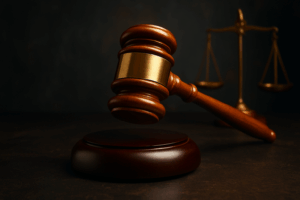Amid growing climate litigation, major oil corporations are turning to free speech protections as a defense strategy against lawsuits accusing them of misleading the public on climate issues, prompting legal experts to critique the inversion of anti-SLAPP laws designed to protect public discourse.
Oil Giants Invoke Free Speech in Battle Against Climate Change Lawsuits

Oil Giants Invoke Free Speech in Battle Against Climate Change Lawsuits
Oil companies claim their rights are violated by climate-related lawsuits, using free speech arguments to push back against legal action.
In a bold move within the courtroom, major oil companies are asserting their First Amendment rights in response to a wave of lawsuits alleging that they misled Americans about climate change. California Attorney General Rob Bonta has spearheaded legal actions targeting industry giants like Exxon Mobil and Chevron, aiming to hold them accountable for the environmental damage attributed to their actions.
These legal battles have taken a surprising turn as the oil companies claim that these lawsuits infringe upon their free speech rights. By invoking anti-SLAPP (strategic lawsuits against public participation) laws, the industry argues that the lawsuits are attempts to silence their voices, twisting the original purpose of these protections that were initially designed to empower critics against powerful entities.
Nicole Ligon, a law professor specializing in free speech and SLAPP issues at Campbell University, remarked, “What we’re seeing now is a complete inversion of the original intent” of such legal provisions. The anti-SLAPP laws enable judges to dismiss cases they consider lacking substantive merit, allowing companies to challenge and potentially eliminate lawsuits that threaten their interests.
The oil sector sees these climate-related lawsuits as an existential threat. Since 2017, nearly 40 lawsuits have been initiated, with municipalities seeking potentially billions of dollars in damages for climate adaptation costs. In an effort to mitigate these challenges, the Trump administration has intervened, pre-emptively suing states like Hawaii and Michigan to prevent them from filing their own lawsuits. Nevertheless, Hawaii has proceeded with its litigation, and Michigan government officials have indicated their intention to continue legal action as well.
As this legal landscape evolves, the intersections of climate justice, corporate accountability, and free speech rights remain at the forefront of the ongoing debate surrounding the oil industry’s influence on climate change discourse.





















